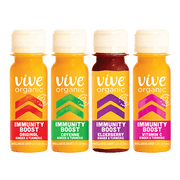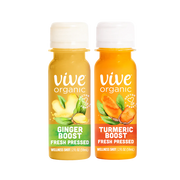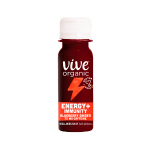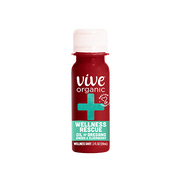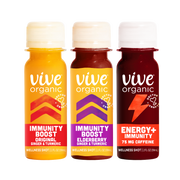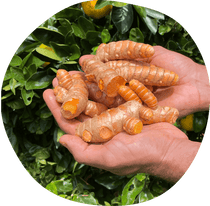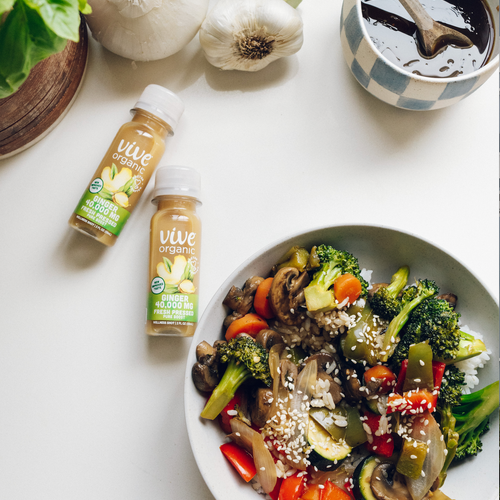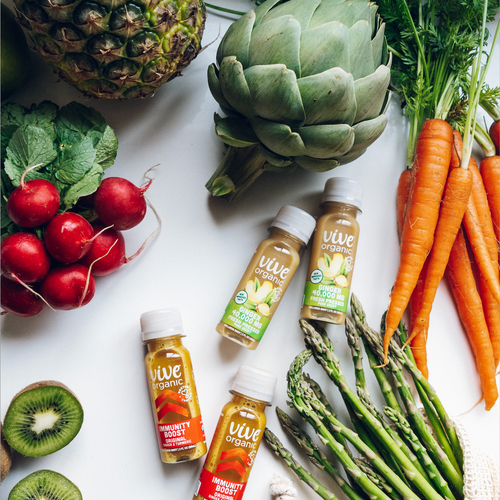Turmeric and its golden yellow color, distinct flavor, and centuries of use have been paving the way for functional medicine. The use of this super root is endless.
In this post, we'll examine some of the scientifically supported health benefits of turmeric and discuss ways to incorporate this spice into your diet — just for the health of it.
What is Turmeric?
Turmeric is a spice derived from the root of the Curcuma longa L. (turmeric) plant and is a member of the ginger family.1
The turmeric plant's roots are fresh or dried and then ground into a fine powdery consistency. Though curcumin is the main active component of turmeric, it also contains trace amounts of ginger's main compound, zingiberene.1, 2
Curcumin has been used for centuries to prepare foods and as a natural food coloring agent. This distinct plant that is rich in polyphenols (antioxidants) and its spice, turmeric, has also been used in Ayurvedic and Chinese medicine.3 Also, this delightfully promising spice is a staple ingredient often used in Indian and Middle Eastern meals.
5 Health Benefits of Turmeric
If you are thinking turmeric is a naturally rich antioxidant then you are summing things up rather well. This plant from nature has been used to support several areas that show health benefits.
Fights Free Radicals
Science has shown that turmeric's bioactive component, curcumin has some pretty incredible antioxidant properties. Curcumin is a polyphenol — a natural plant compound with potential health benefits.
Polyphenols have the ability to function as antioxidants, which means they can counteract free radicals that might otherwise harm your cells.4
Due to their instability and unequal electron distribution, free radicals constantly look to take electrons from other molecules in order to "help themselves." When this happens, we see oxidation occur which may trigger a cascade of unwelcome reactions — like oxidative stress.5
Studies have demonstrated that curcumin possesses the ability to neutralize free radicals and shield cells from oxidative stress.6
So the next time you are planning your meals for the week or just looking to quickly toss together a veggie bowl, consider adding antioxidant rich turmeric powder to spice things up! Adding some black pepper to your dish can enhance absorption of this yummy spice.
May Support Heart Health
Curcumin extract has been shown in scientific studies to support healthy blood pressure and cholesterol levels, both of which are important for heart health.6
In one study, research demonstrated turmeric and curcumin may help patients at risk of cardiovascular disease by improving serum lipid levels. Curcumin can be used as a well-tolerated dietary supplement to conventional medications; however this is one study and more research is needed to resolve uncertainties about the dosage form, dose, and medication frequency of curcumin.6,7
Curcumin or turmeric should not take the place of any medication prescribed by your healthcare provider nor should it be used without discussing it first with your HCP.
Support Immune Health
Curcumin is studied for its potential antimicrobial properties and effects on the immune response. Curcumin works with various cells involved in the immune response to modify the body’s defense capacity.8 Curcumin may also inhibit inflammatory responses by suppressing different metabolic pathways, reducing the production of inflammatory proteins in the body. Even though curcumin appears to be advantageous, ongoing research is warranted.
Why not make an immune-supporting turmeric and ginger shot a must-have and feel the turmeric’s powerful punch to support your immune health and overall well-being?
Anti Inflammatory Support
According to research, curcumin naturally has anti-inflammatory properties that may support the reduction of inflammation in the body. Because inflammation can cause a variety of chronic health problems, including obesity, heart disease, high blood pressure, irritable bowel syndrome, and ulcerative colitis, turmeric and curcumin offer promising health benefits.9
Having a lifestyle that embraces healthy eating, regular physical activity, stress management, and the addition of turmeric to your daily regimen may be an excellent way to keep inflammation at bay.
May Support Healthy Detoxification
Another impressive health benefit of turmeric’s curcumin is that curcumin may help the body's natural detoxification system and support healthy liver function, though more research is needed to confirm these effects. These actions are linked to positive effects, including support for a healthy liver, colon, musculoskeletal, and cellular health.10,11,12
Now, let's look at how we can improve our body's ability to absorb turmeric.
Enhancing the Absorption of Turmeric
Turmeric does not have the greatest track record for being efficiently absorbed on its own, but no worries because we are going to discuss some ways to remedy that below.
- Taking turmeric with black pepper may help improve its absorption. This is due to the piperine in black pepper, which has been shown to increase turmeric’s absorption by 2000%!8
- Adding turmeric to meals that include fats like avocado or olive oil promotes an increase in the absorption by your GI tract.2
Whether you are adding curry to a stew or brewing yourself some fresh turmeric root and ginger tea, remember the many health benefits of turmeric that support your general well-being and give you that cozy feeling that only turmeric can! Enjoy!
Disclaimer: This blog contains promotional content about our products. The information provided in this blog is for educational and informational purposes only and should not be construed as medical advice. While the nutritional information and health tips shared here are based on published studies and expert insights, they should not replace advice and treatment from a healthcare professional. Always consult a qualified healthcare provider with any questions you may have regarding a medical condition or health objectives.
References
- Clinic, Cleveland. “7 Health Benefits of Turmeric.” Cleveland Clinic, 27 June 2024, health.clevelandclinic.org/turmeric-health-benefits. Accessed 13 July 2024.
- Hills, Jenny. “How Cooking and Heat Affect Turmeric (and Black Pepper).” Healthy and Natural World, 7 July 2023, www.healthyandnaturalworld.com/how-heat-affects-turmeric/#:~:text=Turmeric%20is%20closely%20related%20to%20ginger%20and. Accessed July 13, 2024.
- Curcumin and Inflammatory Diseases: Learn About Its Potential Role in Prevention and Treatment. www.todaysdietitian.com/newarchives/090114p56.shtml. Accessed July 13, 2024.
- Alina Petre, Alina, RD MS. “What Are Polyphenols? Types, Benefits, and Food Sources.” Healthline, 23 Oct. 2023, www.healthline.com/nutrition/polyphenols#what-they-are.
- Helmenstine, Anne Marie, Ph.D. (2023, April 5). Oxidation Definition and Example in Chemistry. https://www.thoughtco.com/definition-of-oxidation-in-chemistry-605456. Accessed July 13, 2024.
- Gupta, Nehal et al. “Free Radicals as a Double-Edged Sword: The Cancer Preventive and Therapeutic Roles of Curcumin.” Molecules (Basel, Switzerland) vol. 25,22 5390. 18 Nov. 2020, doi:10.3390/molecules25225390.
- Qin, Si et al. “Efficacy and safety of turmeric and curcumin in lowering blood lipid levels in patients with cardiovascular risk factors: a meta-analysis of randomized controlled trials.” Nutrition journal vol. 16,1 68. 11 Oct. 2017, doi:10.1186/s12937-017-0293-y.
- BSc, Kris Gunnars. “10 Health Benefits of Turmeric and Curcumin.” Healthline, 27 Nov. 2023, www.healthline.com/nutrition/top-10-evidence-based-health-benefits-of-turmeric#anti-inflammatory. Accessed July 13, 2024.
- Allegra, Alessandro et al. “The Impact of Curcumin on Immune Response: An Immunomodulatory Strategy to Treat Sepsis.” International journal of molecular sciences vol. 23,23 14710. 25 Nov. 2022, doi:10.3390/ij
- Mirhafez SR, et al. Drug Metab Pers Ther. 2019 May 30;34(2).
- Panahi Y, et al. Phytother Res. 2014 Nov;28(11):1625-31.
- Bundy R, et al. J Altern Complement Med. 2004 Dec;10(6):1015-8.
